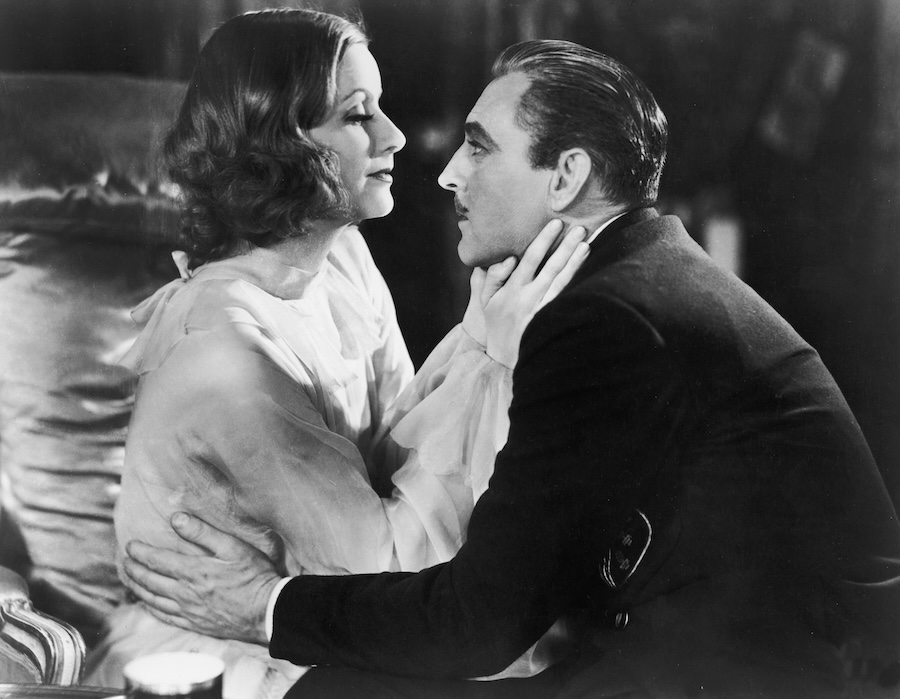
THE SENSATION OF OUR GENERATION!

In the 1930s, the Nazis decided that the Austrian author Vicki Baum’s novels were amoral and had to be banned. By then, Baum had already moved to Hollywood to try her luck as a screenwriter. Her breakthrough novel, ”Menschen im Hotel”, had been published in 1929 and depicted the lives of several people who were staying in a hotel in Berlin. Baum invented the genre of ”hotel novels” and her work was adapted into films on more than one occasion. But Grand Hotel was special, several aspects of it important in the history of Hollywood.
Moonlighting as a jewel thief
It begins with Dr. Otternschlag (Lewis Stone), a permanent resident at Berlin’s Grand Hotel. A veteran of The Great War, his face disfigured but demeanor as noble as ever, notes how people are coming and going, but nothing ever happens. The now classic quote bookends the film and is obviously ironic – because the hotel is packed with drama. We are introduced to the suave Baron Felix von Gaigern (John Barrymore), who knows how to charm the ladies and impress the gentlemen but is in fact broke; he moonlights as a jewel thief and plans to steal from the famous Russian ballerina Grusinskaya (Greta Garbo), who’s also a guest at the hotel. Grusinskaya is in a frail state of mind, her career in decline.
There’s also a German industrialist, Preysing (Wallace Beery), who’s about to close an important business deal and hires a stenographer, a sassy aspiring actress called Flaemmchen (Joan Crawford). And then there’s the pathetic yet lovable Otto Kringelein (Lionel Barrymore), a dying accountant who wants to spend his last days in luxury at the hotel.
Influencing disaster movies
Shortly after its publication, Baum’s bestseller was adapted for the stage three times, in Germany, Britain and on Broadway. Irving Thalberg had bought the rights and as soon as he knew that it was a hit on stage, he turned ”Grand Hotel” into a movie. The final results are notable for many reasons. It influenced the disaster movies of the 1970s, which often subjected a cast of famous people to some catastrophic event in a confined space, be it an ocean liner, a high-rise or an airplane. In the case of Grand Hotel, there’s no grand disaster but small catastrophes happening in people’s lives; the story touches on issues like financial ruin and suicide and reflects on people’s hopes and fears.
Like so many other films from this era, it moves fast and would perhaps have benefited from a slower pace where emotions could mature a bit. It’s a great story, but the impact of the film has faded a bit and modern audiences are likely to find some of the drama a bit creaky. Still, among its many virtues, Grand Hotel boasts a cast of survivors from the silent era, especially Garbo and Barrymore. The former came to define her iconic status as the melancholic star who even gets to say out loud that she wants to be alone; her role is tragic and so is ultimately Barrymore’s.
All in all, it’s still a film with rich doses of humor and sentiment.
They’re terrific and wonderfully supported by the cheeky Crawford; John’s brother Lionel who finds the right approach in his portrait of the sad Kringelein; and Beery who’s both funny and obnoxious, fresh off his Oscar win for The Champ (1931). All in all, it’s still a film with rich doses of humor and sentiment.
Lastly, Grand Hotel is also an example of how production design could be used in novel ways. Art director Cedric Gibbons built a beautiful Art Deco lobby for the hotel and director Edmund Goulding had the lively ensemble gather around it, his camera moving seamlessly between interactions. A greater visual depth helped create the buzzy atmosphere of an international luxury hotel. Grand, indeed.
Grand Hotel 1932-U.S. 112 min. B/W. Directed by Edmund Goulding. Screenplay, Play: William A. Drake. Novel: Vicki Baum. Cinematography: William H. Daniels. Art Direction: Cedric Gibbons. Cast: Greta Garbo (Grusinskaya), John Barrymore (Baron Felix von Gaigern), Joan Crawford (Flaemmchen), Wallace Beery (Preysing), Lionel Barrymore, Lewis Stone, Jean Hersholt.
Trivia: Marie Dressler was initially cast in a role. Remade as Week-End at the Waldorf (1945), and in Germany in 1959. Later a stage musical.
Oscar: Best Picture.
Quote: “I want to be alone…” (Garbo)
Last word: “Imagine working with Lionel Barrymore, John Barrymore, Wallace Beery, Lewis Stone, Jean Hersholt… Greta Garbo. Garbo was my favorite actress in the world, a fascinating woman. To this day I deplore the fact that she is unable to share herself with the world. Such a waste! What made Grand Hotel memorable for me was Lionel Barrymore. He was a dream to work with.” (Crawford in 1962, “A Portrait of Joan”)
